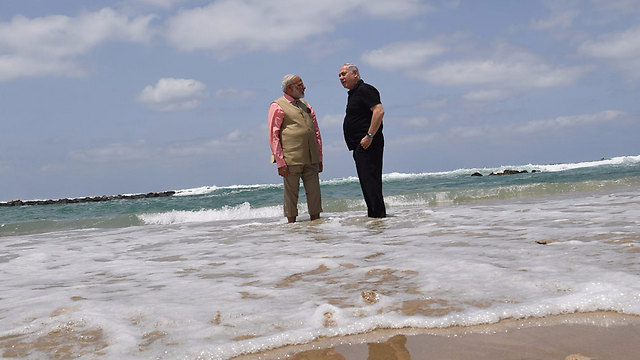Op-ed: These are good times for the State of Israel and excellent times for Benjamin Netanyahu. But if things are so good, why is the prime minister so discontented, so troubled, so frantic? He has reached the point at which the only person who can bring him down is Netanyahu himself.
Makor Rishon is a right-wing religious newspaper whose target audience is national-religious Jews in the settlements. Last Tuesday, Prime Minister Benjamin Netanyahu spoke at a Makor Rishon conference. “Occasionally, I hear that the newspaper’s goal is to strengthen me from the right,” he said. “So I’m telling you, that’s unnecessary. First of all, I come from the right; and second, I’m strong.”
The term “right,” which is currently on the rise, both in Israel and in the world, requires an update. In a crossword puzzle, the four-letter answer to the clue “right-wing” is “hawk.” That’s a mistake. A hawk is someone who favors the use of military force in times of conflict. The most hawkish Israeli leader was Shimon Peres. Right-wing is something completely different.
Teddy Roosevelt, who served as US president at the beginning of the 20th century, was considered a true hawk. The advice he gave his successors entered the pages of history: “Speak softly, and carry a big stick.” This sophisticated piece of advice no longer appeals to right-wing leaders. They prefer to carry a small stick and not hold back on the their tone or volume.

US President Donald Trump is an example: He threatened Iran decisively, but violated his promise to cancel the nuclear agreement; he threatened China never carried through; and most importantly, he released a series of aggressive, arrogant statements against Kim Jong-un, the South Korean tyrant. When Pyongyang realized there was no real intention behind those statements, the missiles began flying.
Netanyahu is much more experienced than Trump in this game. He understands that the people don’t want wars—they want a warlike rhetoric. The lesson is clear: Don’t be a war monger—just don’t be shy on the rhetoric. Give them an enemy to be afraid of; give them constant security tensions; be careful not to give them military funerals.
In his speeches, he describes Palestinian Authority President Mahmoud Abbas as the oppressor of the Jewish people, almost a new Hitler. In practice, his government cooperates with Abbas in the most sensitive area— security—day and night. Last week, Netanyahu met a former left-wing Knesset member at an event. Netanyahu tried to be nice. “We are doing a lot for Israel’s Arabs now,” he said. “What about the Palestinians?” the former MK asked. Netanyahu whispered, as if sharing a secret, as if he knows what the Palestinians say to each other behind closed doors: “They want Jaffa.”
Everything is falling into place for him right now, like pieces on the Backgammon board. Years ago, experts warned that the influx of Muslim immigration to Western Europe would be translated into votes and would make the governments drift away from Israel. The opposite happened: The Muslim immigration was perceived as a threat to personal safety and to Europe’s cultural and religious heritage. Israel gained appreciation as a stable and strong country, a safe haven in the heart of a wild and dangerous Islamic region.
The horrific images from Syria and Iraq that occupied our television screens and newspapers pushed the Palestinian issue to the periphery of the international agenda. The invaluable experience Israel has gained in the war on terror interests Europe’s governments more than the injustices of the occupation; the innovation of Israel’s high-tech industry is more interesting than the expansion of settlements. Not to mention Trump’s America.
These are the good times for the State of Israel and excellent times for Benjamin Netanyahu.
Last week, he posed for photographs with Indian Prime Minister Narendra Modi at the beach, near Givat Olga. In the picture selected by the Prime Minister’s Office, the two are seen standing in the water as the waves lightly wet their pants. Netanyahu is explaining something and Modi is listening. In another photo, Netanyahu is driving a car and Modi is sitting next to him obediently, like a student next to his teacher.
If things are so good, why is Netanyahu so frightened? Why does he give in to every empty threat made by a coalition partner and then reconsiders, like a person in a state of utter panic? Why is controlling a remote television channel more important to him than any other issue on the agenda? Why does he follow up on every provocative statement made by Bayit Yehudi leader Naftali Bennett? How does he benefit from advancing anti-democratic bills which stir up a large part of the public, including part of his public? Why is he so discontented, so troubled, so frantic?
The police investigations are an explanation of course, and so is the feeling of fatigue, and perhaps the revulsion over his family’s excessive presence in our lives. But that’s not enough.
When someone is at the top of the pyramid for so long, looking down at the view can make them dizzy. From this place, the only way is down. Netanyahu has been serving as prime minister for 11 years now: Three years in the first round and eight years, for now, in the second round. He has reached the point in which he is the only person who can bring himself down. Neither Yesh Atid leader Yair Lapid nor the new Labor leader Avi Gabbay can do it. Netanyahu is the only one. The Greeks referred to it as hubris.
As reported by Ynetnews
